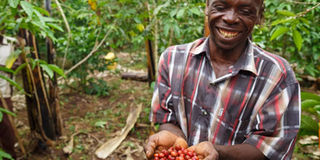URA sets up centres to curb misinvoicing

Under-invoicing. Although Uganda earns a lot of revenue from coffee, much of it is not taxed due to under-invoicing. FILE PHOTO
What you need to know:
- Under-invoiced. According to the Global Financial report, approximately 18 per cent of coffee exports between 2006 and 2015 were under-invoiced.
Kampala. Uganda Revenue Authority (URA) has set up revenue points in countries where Uganda exports different products to curb trade misinvoicing for commodities such as coffee.
The centres have been established in Kenya, UAE and China.
The move is expected to save Uganda millions of shillings that are lost through the out flow due to trade misinvoicing of coffee – Uganda’s primary export commodity.
Trade misinvoicing is misrepresentation of the value of a product.
The potential average annual tax loss from trade misinvoicing amounted to roughly 12.7 per cent of Uganda’s total government revenue over the years 2002/11 with coffee under invoicing inclusive.
According to a Uganda Coffee Development Authority (UCDA) report, coffee exports stood at $32.65m in February comprised of $24.24m of Robusta and $ 8.41m of Arabica.
Uganda exports much of its coffee to Italy, which in February received 95,997 bags, while Germany received 42,524 bags. Uganda exported 38,500 to Sudan and 9,780 bags to Belgium.
Other countries such as Spain received 19,715 bags of coffee from Uganda while US received 13,302 bags.
According to the Global Financial report, approximately 18 per cent of coffee exports between 2006 and 2015 were under-invoiced.
This implies that Uganda lost about $3.2b (Shs11.2b) in coffee exports.
“We have managed to work with URA Customs Department to track coffee exporters and those found not adhering to the export standards of declaring, are apprehended and taken to court, “said Mr Emmanuel Iyamulemye, the UCDA managing director.
He also said that exporters found guilty of avoiding paying taxes risk revocation of their licence.
Mr Nathan Nandala Mafabi, the Budadiri West MP and Bugisu Cooperative Union chairman, said although Uganda was earning money from coffee exports, many of the exporters do not pay taxes.
Ensuring tax payment
Mr Nicholas Musoke, a research and policy analyst at URA, said although cases of tax evasion have been noted they were yet to institute any investigation among coffee trade exporters.
“If we are to have any, it is a case by case basis because every issue manifests itself in a unique way due to the many coffee exporters,” he said, because exporters have to look for the nearest URA customs stations.
This creates unnecessary delays in offering services to coffee traders.
However, he said, URA has been working with UCDA to ensure that the declarations made by coffee exporters reflect the price at which they sell to their clients abroad.




